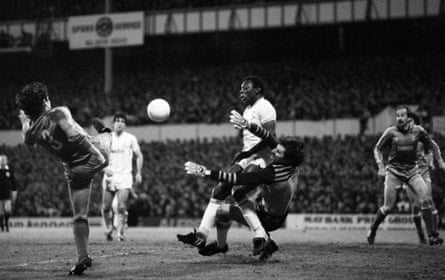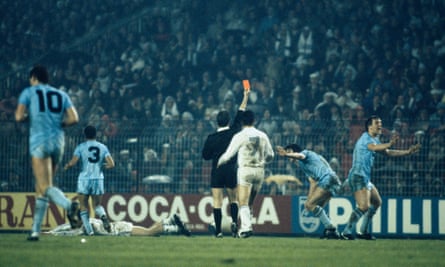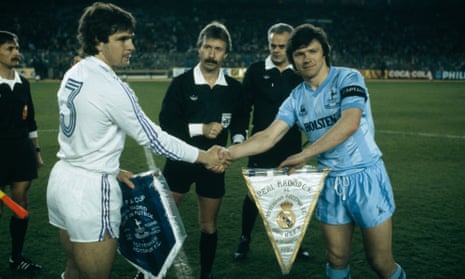Real Madrid were underdogs when they arrived in Tottenham for the first leg of their Uefa Cup quarter-final in March 1985. A recent run of just one win in 10 matches had taken them out of the race for La Liga, leaving Terry Venables’ Barcelona to run away with the title and Madrid to finish fifth. Their manager, Amancio Amaro, who had won nine league titles and a European Cup while playing for the club, was under pressure, with Ramón Mendoza expected to replace Luis de Carlos as president in the summer.
It was rumoured that Amaro would only save his job by winning the Uefa Cup, but Real Madrid seemed determined to do things the hard way. A 5-2 aggregate win over SSW Innsbruck in the first round was comfortable enough but a 3-1 defeat in Yugoslavia against Rijeka in the first leg of the second round looked to have ended Real’s hopes of winning their first European trophy in 19 years.
Cue comeback No1. Three goals in the last 23 minutes of the second leg sealed a dramatic 4-3 aggregate win – and there was more to come. Next up Real drew Anderlecht, who had won the Uefa Cup in 1983 and been beaten in the final by Tottenham in 1984. Real lost the first leg in Belgium 3-0, but an Emilio Butragueño hat-trick inspired an astonishing 6-1 win in Madrid, setting up a quarter-final with Peter Shreeves’ high-flying Tottenham team.
Shreeves could not have asked for a better start to his Tottenham reign after taking over from Keith Burkinshaw. Sitting second in the table behind Everton, the club were aiming to win their first league title since 1961. Not only was their domestic form good but, also in contrast to Real, their run to the last eight of the Uefa Cup had been relatively stress-free.
A 9-0 aggregate win over Braga was followed by a 4-2 win over Club Brugge, although their 3-1 victory over Bohemians Prague in the third round did come at a cost. Glenn Hoddle and Graham Roberts left the pitch with stitches in a bruising second leg in Prague, with Roberts also picking up a booking that kept him out of the first leg of the quarter-final at White Hart Lane. Given Real Madrid’s home form in the competition, Tottenham were desperate to take an advantage to the Bernabéu.
Real were neither the force they had been nor the team they are today. Not only were they said to be £5m in debt and struggling to pay their players’ wages, they also hadn’t won a league title since 1980 or a European trophy since 1966, when their manager had been playing in midfield. The glory days of Alfredo Di Stéfano and Ferenc Puskás seemed like a distant memory but, with players such as José Antonio Camacho, Uli Stielike, Ricardo Gallego, Butragueño, Santillana and Jorge Valdano, they still had enough talent to threaten Tottenham’s proud record of never losing a home match in Europe.
The English press expected Tottenham to go through. “I bear Tottenham no ill-will,” wrote David Miller in the Times. “But it is sad to see a club such as Real struggling after all the years of setting standards and arriving in London as palpable underdogs.” With Paul Miller and Tony Galvin declared fit, Gary Stevens moving to centre-back to fill in for Roberts and Mickey Hazard returning to the team, confidence was high in the Spurs camp.
In the end a determined Real Madrid team left London with a slender lead. The only goal of the evening came after 14 minutes. During a move started in their own area, Camacho, Stielike and Michel all combined to send Butragueño away down the right. Turning Miller inside out, Butragueño fired across goal, only for Ray Clemence to get a slight touch on the ball, which in turn gave Steve Perryman no chance to react. The Spurs skipper could only look on in horror as the ball struck his knee and went into the net, giving Real a crucial away goal.
Tottenham had started well, with Hazard going close before Perryman’s own goal. Yet the away goal took the wind out of Tottenham’s sails. Valdano squandered a glorious chance to double the lead and Butragueño also put a header wide. Tottenham came closest to scoring in the second half but it was to prove a night of pure frustration for Shreeves and his players. Galvin had a goal wrongly disallowed for offside; Garth Crooks was let down by a poor touch when through on keeper Angel; Mark Falco’s cross just eluded Hazard; and Hoddle drilled an effort agonisingly wide. The home team huffed and puffed but could not find a way through. For the first time in 44 ties in European competition, they had failed to score at home.

The English press had to reassess their opinions. “The sacrificial lambs turned out to be more like slippery eels,” wrote Steve Curry in the Express. “So much for the relative merits of the English and Spanish leagues,” said Stuart Jones in the Times. “The Spaniards were technically superb,” declared Harry Miller of the Mirror. All of the reporters agreed that Tottenham had lacked invention when faced with Real Madrid’s defensive organisation. Full-backs Camacho and Chendo had kept John Chiedozie and Galvin quiet, with Michel and Angel blunting Glenn Hoddle and Hazard in midfield.
“It doesn’t please me to say that Real played some superb stuff at times,” said Shreeves. “This is a night when we must salute the victors. It will need a special performance in the return game if we are to get through.” As the crowd of 39,914 filed out of White Hart Lane, the Tottenham PA announcer somewhat boldly said: “This tie is far from over.”
Tottenham travelled to Spain for the second leg with a spring in their step, coming off the back of their first win at Anfield since 1912. Meanwhile, Real were still wobbling in La Liga, losing 1-0 at Osasuna. With Stielike ruled out due to hepatitis, there was a glimmer of hope for the visitors. Tottenham contained Real during the early stages and created a few half chances as they grew into the game. But the cruellest blow was still to come. In the 75th minute, Falco rose above José Salguero and headed the ball past Angel and into the Madrid net but the referee saw an infringement and disallowed the goal. Tottenham looked destined to go out and their fate was all but confirmed when Perryman was sent off three minutes later for a crude foul on Valdano.

Real progressed 1-0 on aggregate and went on to lift the trophy. They lost the away leg of their semi-final against Inter 2-0 before, you’ve guessed it, pulling off an impressive 3-0 win at home. That victory set up a final with Hungarian team Videoton FC but Amaro would not be around to enjoy the fruits of his labour, having resigned a few days after the defeat in Milan. Luis Molowny stepped in and led the club to a 3-1 aggregate win over Videoton. Real successfully defended the trophy the next year, pulling off more memorable comebacks against Borussia Monchengladbach and Inter along the way.
Shreeves would never experience such heights again. Five defeats in Tottenham’s remaining league fixtures – all suffered at White Hart Lane – left them third in the First Division. Shreeves suffered second-season syndrome and, come May 1986, he was replaced by David Pleat. However, as the years have progressed, Shreeves’ debut season has become more and more impressive. No manger had improved on Shreeves’ third-place finish in 1984-85 until Mauricio Pochettino secured second place in the Premier League last season and, who knows, with a little more help from the officials, he could have knocked Real Madrid out of Europe.

Comments (…)
Sign in or create your Guardian account to join the discussion